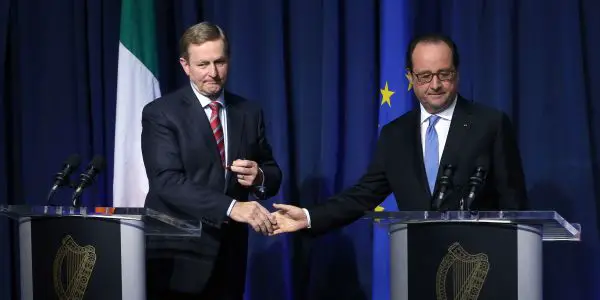The Irish border will be a special case in the Brexit negotiations, French president Francois Hollande has said.
In Dublin for talks with Taoiseach Enda Kenny, Mr Hollande called for Britain to begin its split from the European Union sooner rather than later and for the discussions to be as short as possible.
Amid concerns the open border with Northern Ireland could return to customs, police and immigration checks, the French leader said he understood concerns about the peace process.
“I do recognise there is a special situation here for Ireland,” he said.
“It’s a special situation and it has to be found a special place in the negotiations.”
Mr Hollande’s trip to Dublin was arranged before last Friday’s Bastille Day atrocity in Nice.
Eighty-four people were killed when Tunisian Mohamed Lahouaiyej Bouhlel drove a truck into crowds enjoying celebrations and fireworks over the Promenade des Anglais.
Another 15 people remain critically ill in hospitals.
On the ramifications of Brexit for Ireland’s soft border with Northern Ireland, the Taoiseach reiterated that the UK-Ireland Common Travel Area and freedom of movement should remain.
“We do not favour a hard border. Obviously we do not want to see a European border from Dundalk to Derry, that would not be acceptable,” the Taoiseach said.
“We’d be vigilant in terms of people moving through who might have tendencies to be involved in terrorist activities.”
While Mr Hollande’s trip to Dublin has been scaled back in the wake of the terror attack, he retained a commitment to meet President Michael D Higgins.
A statement on behalf of the two leaders called on Britain to trigger Article 50 and begin the process of Brexit as “soon as possible”.
Mr Hollande dismissed suggestions which have been floated that the negotiations may not begin until December.
“Should the negotiations be shorter? The most important thing is that they should not drag on,” the president said.
“The sooner the negotiations are open the better, and the shorter the better.”
And he called on British politicians to accept reality.
“It’s a decision that was taken by the British people,” Mr Hollande said.
“Firstly it was the British who will have to bear the consequences. Europe will try its best to give its best relationship with the UK.
“But there’s a time the politicians have to accept this vote. They have to accept the consequences.”
Mr Kenny also said the French leader was aware of the importance of the role the EU played in cementing the peace process in Northern Ireland.
“Europe has contributed greatly to the support of the Good Friday Agreement in putting that fragile peace together,” the Taoiseach said.
“We see, as a country with a land border here, this peace process is absolutely essential.”
Mr Hollande’s Dublin visit was one in a series of meetings with fellow European leaders this week including British Prime Minister Theresa May.
Security and counter-terror issues were also top of the agenda with the Taoiseach.
Mr Hollande called for greater sharing of information between countries facing the terrorism threat.
“We have to exchange as far as possible information to track a certain number of individuals and avoid any doubt setting in,” the French leader said.
Mr Kenny said Ireland was working on laws which may allow data and information on terror suspects in Ireland to be shared with Britain.
“Obviously where information might be available, which might be tracking terrorist activities or communications, this is an important priority for Ireland to assist in preventing terrorist activities,” he said.
The French president spent around an hour with Mr Higgins at Aras an Uachtarain behind closed doors and signed the visitors’ book.
